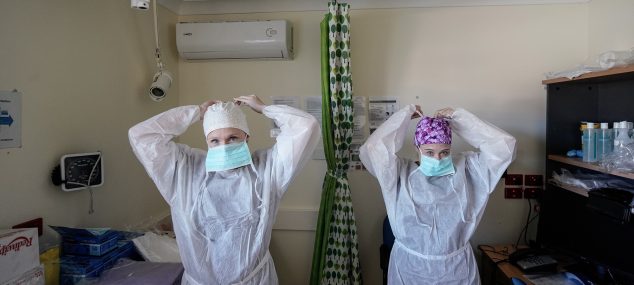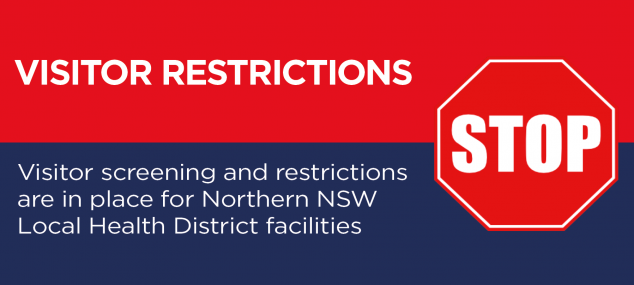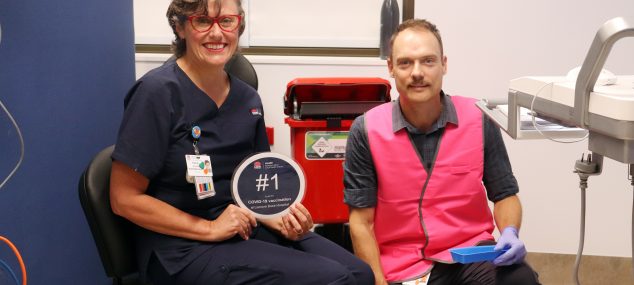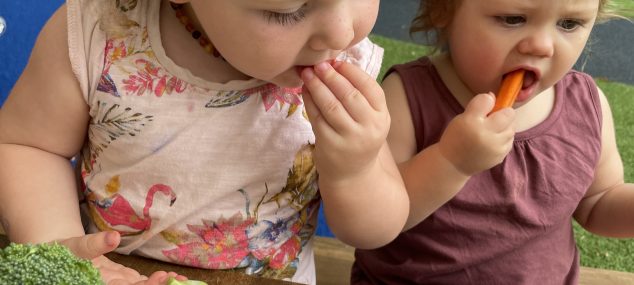Monthly Archive: March 2021
Published
2021/03/30 at 4:03 pm

Testing clinics extended in the wake of latest COVID-19 cases
Additional testing clinics and expanded hours are providing extra opportunities for people in Northern NSW to come forward for COVID-19 testing following recent COVID-19 cases in Queensland.
In the first 24 hours after being alerted to new locations of concern in Byron Bay, more than 800 people turned out to get tested at clinics in Northern NSW.
“The response from our community, right across the region, has been outstanding so far. We thank everyone who is taking heed of the latest public health advice.” NNSWLHD Chief Executive, Wayne Jones said.
“From the Tweed border right down to Grafton we’ve seen a positive turnout of people coming forward for testing, and we expect to see these numbers increase even further, as more tests are notified to NSW Health.
“It’s imperative that people continue to use the QR check-in codes at every venue or business they visit, as that allows the contact tracers to follow up anyone who may have been at a location of concern.
“Please check the Queensland Health website and the NSW Government websites regularly for updated locations, particularly over the next few days as this situation evolves.”
Northern NSW Local Health District has extended the opening hours of the four hospital-based testing clinics in Lismore, Grafton, Byron and Tweed, which are now open from 9.00am – 6.30pm seven days a week.
Additional clinics have been set up in the region:
• Byron Bay QML Pathology Drive-Through, Cavanbah Sports Ground, 249 Ewingsdale Rd, Byron Bay.
Open from 8am to 8pm Monday - Sunday. No referral required.
• Byron Bay Walk-in Pop-Up Clinic; Byron Bay surf club, Bay St, Byron Bay.
Open from 9am - 5pm. No appointment required.
• Lennox Head QML Pathology Drive-through clinic, Lennox Community Centre, Cnr Park Lane and Mackney Lane, 8am – 8pm Monday - Sunday. No GP referral required.
• Tweed Heads QML Pathology Drive-through clinic, Cnr Wharf and Florence Street, Tweed Heads, 8am – 8pm Monday -Sunday. No GP referral required.
• Lismore QML Pathology Drive – through clinic, 354 Keen Street, Lismore 8am – 7pm, open from this afternoon.
Staff and visitors to hospitals and health facilities in Northern NSW are now required to wear a mask as part of added precautions to reduce any risk of transmission.
“Our staff are doing a fantastic job and we’re exceptionally thankful for their continued efforts, especially as the response continues to evolve and change,” Mr Jones said.
People who have been in Greater Brisbane since 20 March who are now in NSW must also comply with the same stay at home restrictions that apply to Greater Brisbane, regardless of their current location.
This means anyone who has been to Greater Brisbane since 20 March is required to stay at home, except for essential reasons that include shopping for food and supplies, exercise, work and medical care, under the Public Health Order. People who have only transited through Brisbane Airport are excluded from these restrictions.
Entry declaration forms were introduced on Saturday 27 March for people who are entering NSW after spending time in Brisbane City Council or Moreton Bay Regional Council areas in the previous 14 days. This requirement has now been extended to Greater Brisbane, which includes Brisbane, Logan, Moreton Bay, Ipswich and Redland Local Government Areas and these declaration forms will be available on the Service NSW website later this evening.
These forms provide critical information to enable NSW Health to contact travellers if required and is for all travellers who intend to enter NSW by air, road and rail. This form includes contact details and confirmation whether people have been to any venues of concern. Declaration forms can be completed within the 24-hour period prior to entering NSW, or on entry to NSW.
NSW Health is advising people in NSW against non-essential travel to the Greater Brisbane area at this time.
Photo above: Nurses at Tweed Hospital Fever Clinic
Published
2021/03/28 at 11:20 am
Restrictions for Northern NSW Local Health District facilities – Queensland areas

In response to the latest cases of COVID-19 detected in the Brisbane community, hospitals in Northern NSW Local Health District are restricting entry for visitors who have been in the Greater Brisbane area.
Anyone who has been in the council areas of Brisbane City, Moreton Bay Regional, Ipswich City, Logan City and Redland City since 11 March will not be permitted to enter a health facility in Northern NSW.
Visitor screening and temperature checking are in place across the District.
Please continue to seek medical care as usual.
People entering NSW from Queensland who have been in Brisbane City Council or Moreton Bay Regional Council since 11 March 2021 must avoid non-essential visits to hospitals and residential aged care facilities and disability residential care services across NSW until further notice.
People who have been in the two areas who work in hospitals, residential aged care facilities and disability residential care services should check with their employer, monitor the Queensland Health website for further advice, and use masks when at work.
“We acknowledge these restrictions may inconvenience our community, but they are a necessary and temporary measure to minimise any risk of transmission among our vulnerable patient population,” NNSWLHD Chief Executive Wayne Jones said.
Anyone entering NSW by any means who has been in Brisbane City Council or Moreton Bay Regional Council areas since 11 March is required to complete a declaration form, which includes confirmation of whether they have visited any venues of high concern (listed as ‘close contact venues’ on the Queensland Health website). This information is important to help NSW Health contact them if required.
Other arrivals to NSW from Queensland, particularly those who have been in the Brisbane City Council or Moreton Bay Regional Council areas, are asked to be vigilant for symptoms, regularly check the Queensland Health website for updates and immediately follow the public health advice.
“Please come forward for testing at one of the clinics in Northern NSW if you have any COVID-19 symptoms, however mild, or have been advised to get tested by NSW or Queensland Health,” Mr Jones said.
“There are four hospital testing clinics at The Tweed, Lismore Base, Byron Central and Grafton Base, which are open seven days a week, and other respiratory clinics across the region.”
NSW Health urges everyone to continue to take practical measures to stay COVID-safe. This includes always using QR codes to check in to venues, staying home and getting tested for COVID-19 if unwell, and practising good hand hygiene.
There are more than 350 COVID-19 testing locations across NSW, many of which are open seven days a week. To find your nearest clinic, visit: https://www.nsw.gov.au/covid-19/how-to-protect-yourself-and-others/clinics, or contact your GP.
Published
2021/03/26 at 11:12 am
Public Health Advice – avoid flood waters

With the recent heavy rain and flooding across the region, North Coast Public Health Unit Director, Paul Corben has a timely reminder on how to reduce the risks of injury, sickness or infection.
“Floodwaters can contain many pollutants that are harmful to your health. Should you need to clean up please remember to wear safety equipment including boots, gloves and eye protection and wash your hands thoroughly,” Mr Corben said.
“You don’t know where the water has come from. If you can, avoid entering floodwater as it may be contaminated with raw sewage or chemicals from a backyard garden shed. These hazardous chemicals and germs can easily make you sick or lead to infection.”
If a ‘boil water alert’ has been issued in your area, observe it strictly to prevent illness. Water used for drinking or food preparation should be brought to a rolling boil to make it safe. Kettles with automatic shut off switches can do this.
If you rely on tank water, please be aware of the potential for contamination from polluted flood water and have your water tested and treated if necessary. If in doubt, use alternative clean water until it is confirmed safe to use.
Should your house become flooded please look out for dangers including contaminated food and medicines, unsafe electrical appliances, and damaged structures.
Also keep an eye out for animals such as snakes and spiders which may have taken refuge in your house.
“Mosquitos and other disease-transmitting biting insects can also become a problem, particularly when floodwaters start to recede and leave still pools where insects quickly breed. Avoid insect bites by using insect repellent and wearing appropriate personal protection such as long sleeves, shoes and socks,” Mr Corben said.
Click here for more advice on staying healthy during and after floods and storms.
If you need emergency assistance in a flood or storm, call the State Emergency Service (SES) on 132 500.
For a medical, police or fire emergency call Triple Zero (000).
Published
2021/03/17 at 3:04 pm
Vaccine rollout begins at Lismore Base Hospital vaccination clinic

Healthcare workers rolled up their sleeves to receive the first jabs of the Oxford/AstraZeneca COVID-19 vaccine at the Lismore Base Hospital vaccination clinic this morning.
Intensive Care Registered Nurse, Rachel Benson was the first to receive the vaccine in Lismore, and said it was important for everyone able to be vaccinated to protect each other from COVID-19.
“It’s another layer of protection for myself and my family, and my community, so I’m very excited to be receiving the vaccine today,” Ms Benson said.
Infectious Diseases trainee, Dr David Stephenson, who has worked with patients who have had COVID-19, also received the vaccine today and encouraged others to do the same when it’s made available to the broader community.
“By getting the vaccine, I’ll have more confidence in treating any future COVID-19 patients we may have,” Dr Stephenson said.
“When it comes to the community’s turn, I would say ‘roll up your sleeve!”
Northern NSW Local Health District Chief Executive Wayne Jones said the clinic opening was a fantastic development in the pandemic response.
“It’s a great milestone today that we’re providing our first COVID-19 vaccines just 366 days after our very first case of COVID-19 in Northern NSW,” Mr Jones said.
“We are more than excited to be at this point.”
“Every staff member and clinician who works in Northern NSW Local Health District will be offered a vaccination.”
Mr Jones reiterated the strong evidence around the efficacy of the AstraZeneca COVID-19 vaccine to protect against severe illness and death, which is great news for our communities and for staff working in our health facilities.
“Every box that needs to be ticked in the development of the vaccine has been ticked,” Mr Jones said.
“I’ll be stepping up and getting the jab when my number comes up.”
Staff will receive two doses of the AstraZeneca vaccine, given approximately 12 weeks apart.
NSW is working closely with the Australian Government to implement a safe and effective COVID-19 vaccination program.
For more information about COVID-19 vaccination in NSW, visit the NSW Health website.
Feature photo: Rachel Benson, ICU Nurse and Roger Revill, Nurse Immuniser
Published
2021/03/16 at 1:13 pm
Home dialysis changing local patients' lives

Northern NSW Local Health District is helping change the lives of patients with kidney disease by giving them the option to do dialysis from the comfort of their own home.
Chronic Kidney Disease Nurse Practitioner Graeme Turner said more patients should consider the home-based treatment this Kidney Health Week, as it can provide many lifestyle benefits.
“While not all patients are eligible for home dialysis, it’s a great option for people who are after a flexible treatment program,” Mr Turner said.
“There are a range of home dialysis options which have different requirements and benefits. With the renal team, patients can choose which type of dialysis best suits their lifestyle and abilities in light of their medical circumstances."
“Home dialysis means people can go about their day, and then connect to the machine overnight, receiving treatment while they sleep.”
Dialysis is used to clear toxins and regulate the fluids that the body ingests or generates, where a person’s own kidney function is reduced.
The District has a team of renal clinicians and specialist training units to provide support to patients using home dialysis, including teaching them how to administer the treatment and self-needle.
As part of home dialysis training, Casino resident, Corey Dunn learnt how to get the machine ready, take measurements and troubleshoot any issues.
“Everything the nurses usually do in the centre, they teach me how to do at home, so I can set up my own machine and solve my own problems,” Mr Dunn said.
“Once I’m at home doing this, I will have time to return to work, and have a better lifestyle. I feel a lot more in control and independent now that I know how it all works.”
Banora Point resident Alby Ross started home dialysis in his 70s. For him, the flexibility to do the treatment at a time that suited him, and the ongoing support, were major factors in his decision.
“You can do it any time you like, and it becomes part of your life,” Mr Ross said.
“The nurses inspire confidence in people. There’s plenty of support there, and that’s what you need. They’re there 24 hours a day.”
For more information on home dialysis visit: https://kidney.org.au/resources/books-and-publications or find out more about renal services in Northern NSW Local Health District
Published
2021/03/16 at 8:38 am
NSW Students Take on ‘Big Vegie Crunch’ Record

More than 12,000 Northern NSW children will be participating in this year’s “Big Vegie Crunch”, as the state attempts to break its 2018 vegetable eating record.
In 2018, more than 50,000 kids in schools and early childhood services crunched into vegetables simultaneously, setting a record to beat on March 18.
Northern NSW Local Health District’s Acting Health Promotion Manager Gavin Dart said the challenge began as a local initiative in 2015, but it has now grown into a
fantastic statewide program.
“The Big Vegie Crunch is a great way to get children to try new vegetables, as it increases their knowledge, exposure and attitude towards vegies,” Mr Dart said.
“We know only six per cent of Australian kids eat enough vegetables each day, when it’s recommended that they eat around five serves for a nutritious diet.
Parents are amazed their children are eating more vegetables, and a greater
variety of vegies, after their school or service is involved in the challenge.”The Big Vegie Crunch is part of Vegetable Week, a free, quick and easy event for NSW primary schools, funded by NSW Health.
Parents looking for simple, kid friendly recipe ideas to increase their child’s vegetable intake can visit the NNSWLHD Health Promotion recipe page online at https://bit.ly/HLBrecipesPictured above: Celeste and Arianna at Ocean Shores Early Learning Centre enjoy their vegetables in preparation for the Big Vegie Crunch this week.
Published
2021/03/15 at 2:49 pmHealth staff to receive COVID-19 vaccinations from this week
The Northern NSW Local Health District will start providing COVID-19 vaccinations to its staff from Wednesday 17 March, 2021.
“It’s an exciting milestone for our District, as we start to bring our local clinics on board as part of the NSW Health vaccination program to protect our staff and vulnerable residents from COVID-19,” Chief Executive, Wayne Jones, said.
Northern NSW Local Health District will commence three COVID-19 vaccination clinics at Lismore Base Hospital on 17 March, The Tweed Hospital on 19 March and Grafton Base Hospital on 22 March.
In the coming weeks, outreach clinics will also begin operating at the Multi-Purpose Sites at Bonalbo, Nimbin, Kyogle and Urbenville.
Initially, the clinics will provide vaccines for health staff, residential aged care residents, and local Ambulance personnel.
The clinics will use the Oxford/AstraZeneca vaccine, which requires people to receive two vaccinations approximately 12 weeks apart.
“It’s extremely exciting to know that almost 12 months to the day after our very first case of COVID-19 in Northern NSW, we are now able to administer a vaccine which will enable our communities to be protected from the most severe effects of the disease,” Mr Jones said.
The first COVID-19 case was recorded in the Northern NSW Local Health District on 16 March 2020, and there have been 68 cases among residents to date.
“I also need to thank our extremely hard-working health staff who have been supporting our community and our health service in every aspect of the pandemic response. Standing up the vaccine clinics so quickly is another example of the outstanding commitment of our dedicated staff,” Mr Jones said.
Members of the public can check the Australian Government’s online vaccine eligibility checker to see which group they are in, and when they will be likely to receive the vaccine.
More information on the COVID-19 vaccination rollout in NSW is available on the NSW Health website.
